Disagreements in poker are common. But when your opponent is a player who has over $2 million in cash game profits and charges $1,000 an hour for training, you're probably better off shutting up and just soaking up the free information.
Today I’ll tell you about my dispute with Jayser1337, who has been tearing apart high stakes for many years. At some point, the discussion got a little out of control. But even from these showdowns, everyone can benefit.
It all started with a friendly skirmish between two 2+2 users. DooDooPoker and Wumpy had different opinions about the same hand. To decide who was right, they opened a new topic and asked respected trainers, including me, to speak out. Here's the hand itself:
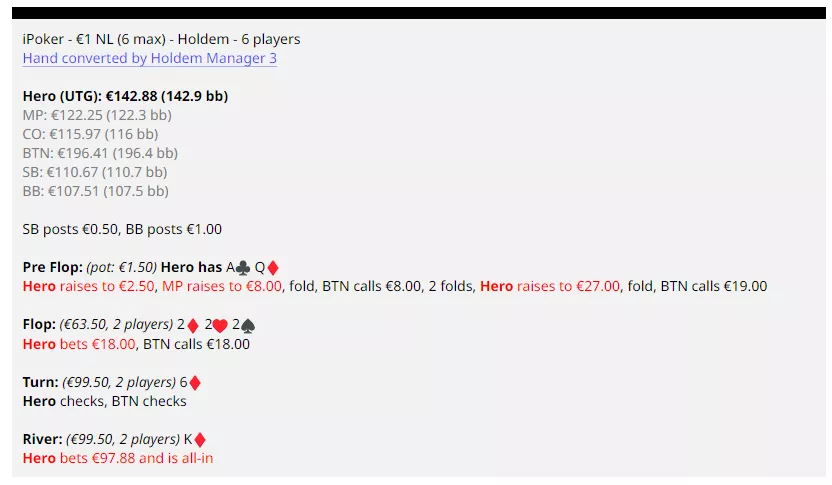
The player on the button is an amateur. The point of contention: if we are considering two options – call or 4-bet, which action will have a higher expectation?
DooDoo is confident that he should call. Here's his explanation: "In heads-up pots, the 4-bet with zero EV means having a cold caller will not increase our expectation in any way. After a call from a weak player, the fold equity of our 4-bet only drops, and the EV of borderline hands like AQo is largely created by fold equity.”
Wumpy disagrees with this logic: “We get part of the EV in situations where our 4-bet is called. And since we assume that fold equity will decrease, then at least one of the opponents will call very wide. This is a strong argument for 4-betting since we're running the pot against a lot of dominated hands."
My first reaction to the discussion is that of course you need to 4-bet. I was completely convinced by Wumpy's arguments, plus the prospect of playing a 3-bet pot against two opponents, sitting out of position with , seemed downright terrible. But before speaking publicly, I decided to get acquainted with the opinions of other coaches. By that time, four coaches had responded to the thread – two voted for 4-bet, two voted for calling. To my surprise, one of the coaches who called was Jayser. In the past, he was a regular high-stakes player, even reaching NL40k. Here is his entire post:
In the original message, the author of the hand wrote: “Fish stats on the button are 55/15 in 40 hands.”
This is a critical factor because our decision to call/4-bet or fold depends on the player who is cold-calling. If this were a regular, we would choose between 4-betting or folding, and the decision would be made using a randomizer with a 50/50 chance. We cannot call because we are dominated by his slowplays with , and if we catch an ace or queen, we still won’t have the necessary implications against / or / .
Let's go back to our fish spot. There is not much information about him, he played only 40 hands, but we can assume that he is a nice loose-passive kid.
How should MP range change with such a player behind you? If he plays the standard preflop strategy of 3-betting or folding, then with such an opponent he should add flat calls in order to have a wider VPIP against the fish. That is, the calling range should include all suited broadway cards, small and medium pairs, strong suited aces, 50% AQo, and for protection it is also worth adding hands that play well in multiway pots, for example, 50% / .
There's no point in slowplaying with , because this hand doesn't play well in multiway pots, – can be mixed – 25% call, 75% 3-bet. It turns out that the main candidates for 3-betting are all AKo, half of AQo, some KQo/AJo and A4-A5s. Against this range, taking into account the pot odds, our hand looks relatively good.
Fish's range is not so predictable, there is a wide range of hands from rare slowplays to random suited connectors. AQo stands up well against such a range, and against fish there are still excellent implied options.
Against our 4-bet, the reg will fold all dominated hands (KQ, AJo, rare AJs, KQs, QTs, JQs, with which he did not call. Bluff pushes (if the fish folds)/calls/folds with A4-A5s become indifferent. We will get a call from AA, part of AK and QQ-TT. This situation does not suit us. After the call from the reg, the fish will call or shove the hands that he slowplayed, and we will find ourselves in a huge 3-way 4-bet pot out of position with a dominated hand.
Therefore, I will always call preflop and be extremely careful postflop, constantly reminding myself how dominant my hand is. The only thing that makes calling profitable is the implied odds against the fish's loose range. Without this factor, you would have to choose between folding or calling.
Essentially, Jayser is saying that this situation should not be treated as a typical hand between UTG and MP, whose strategy is only 3-bet or fold.
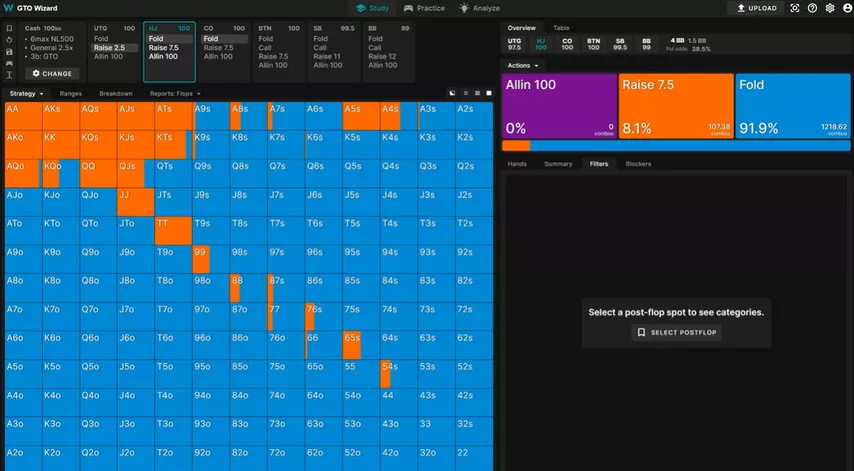
The situation under consideration is closer to the button playing against a raise with UTG.
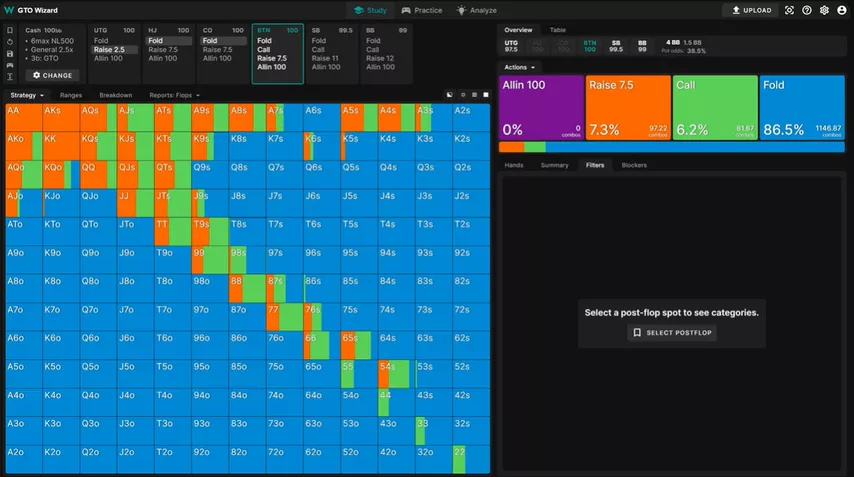
A 3-bet from the UTG button should really call wider.
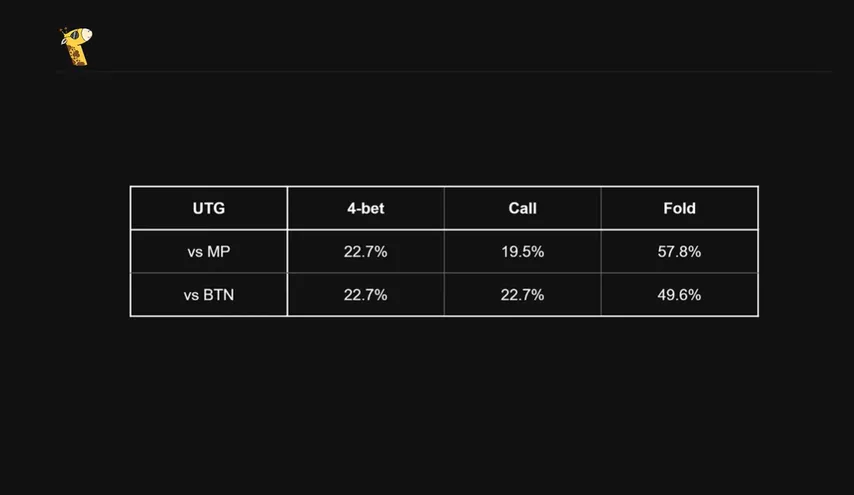
Button 3-bet 1% less often than MP, but his range is more polarized. He has more weak hands like K9s and AJo and fewer strong hands like AKo, which he will sometimes call.
Against a strong 3-bet with MP, calling is not a good idea. His range includes fewer bluffs with poor equity and more hands that will make a very difficult decision against a 4-bet. Therefore, with AQo our strategy comes down to 4-betting or folding.
It all sounds very logical, but it still didn’t completely convince me. A polarized 3-bet range from the button does not make calling better than a 4-bet.
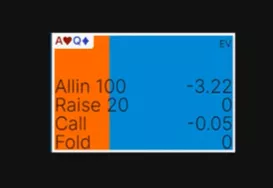
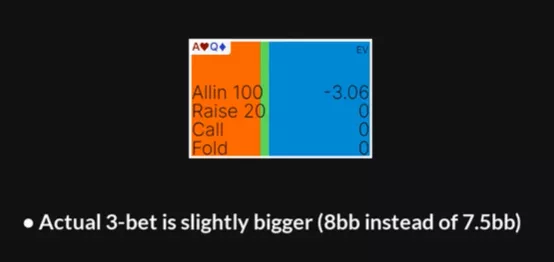
In addition, in the hand the 3-bet sizing was half a blind more, this is another factor in favor of the 4-bet.
If a fish's wide cold calling range increases the EV of calling a 3-bet, then it will also increase the EV of a 4-bet. It is very difficult to say where exactly the growth will be greater.
After reading all the answers, I left the following post in the thread:
I strongly advocate 4-betting. I carefully read the topic, Wumpy’s arguments sound very convincing. Especially the idea that we don't need to take out our opponents' equity if we think our hand has enough equity if one of them calls. There are too few scenarios in which calling will pay off. If the fish has a tight calling range, then you just have to throw away. If wide – is an obvious candidate for a 4-bet.
This spot can be compared to defending the BB against a single raise. With AQo we mix calls and 3-bet, but it is worth adding one or two calls to the simulation, and even are played exclusively with squeezes.
And it doesn’t matter whether we were faced with only a raise or a 3-bet as well; in the presence of cold callers, we must play hands with thin value sharply. We'll lose a big pot when they show us +/ , but against the rest of the range we either play a flip or are higher.
In a situation where we have a 3-bet and not a raise, everything is the same.
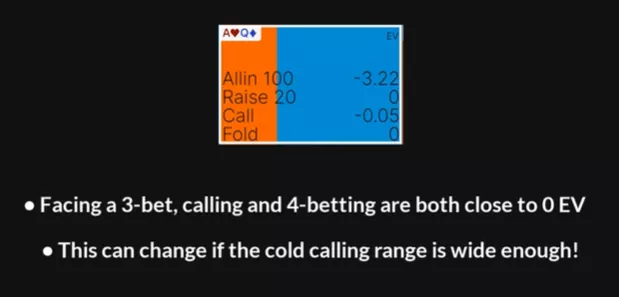
Both 4-betting and calling are near-zero actions because your opponent's range is much stronger. But if you add a player who called, then it is very likely that a 4-bet with becomes a +EV action.
The solver does not show this because it gives the caller a strong range in which there are many higher hands .
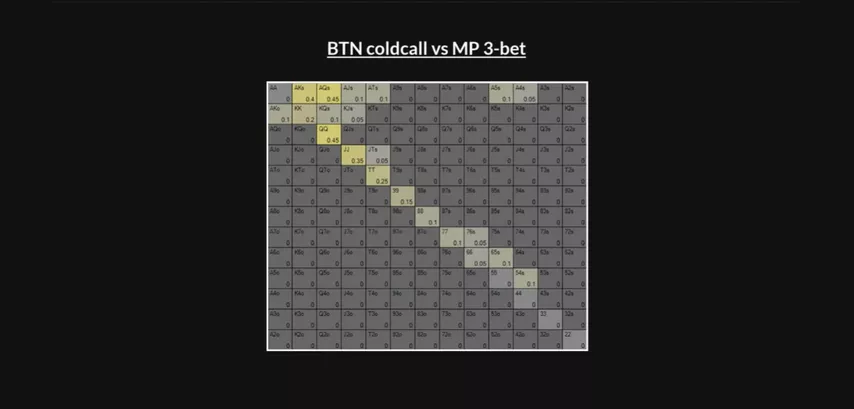
But the 55/15 fish will not call according to the range from the solver, he will have both small pairs and suited connectors.
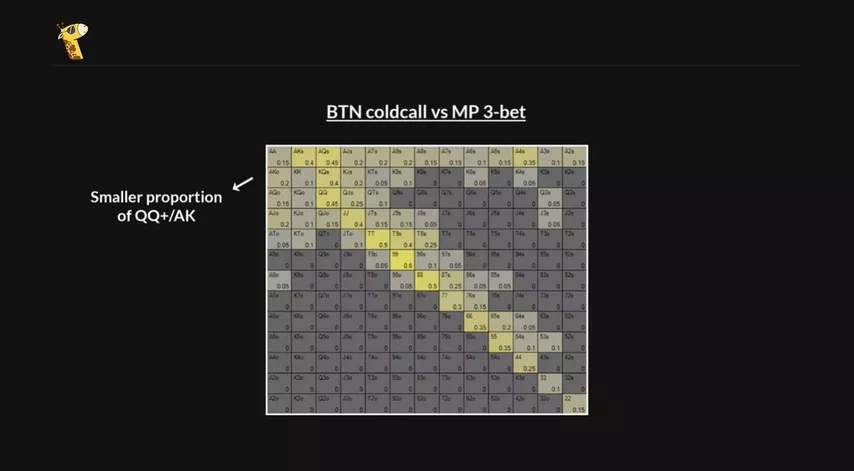
Again, if the button has a tight range, then it's better to just throw away. If wide, then 4-betting to try to isolate him will benefit us more. I don't see situations where calling is the most profitable action.
DooDoo's logic of "we need fold equity to make a 4-bet worthwhile, and we don't have it" is flawed. Low fold equity does not mean that the EV of a 4-bet will also decrease. Unfortunately, DooDoo did not accept my arguments, he even advised me to re-read the post and attributed the words to the fact that I deliberately gave the cold caller a weak range. Naturally, I didn’t say that, which was immediately pointed out to him by other regulars.
In any case, I advise everyone to read this topic, there is a lot of useful information there (Ed. – the link can be found in the description of the video ). As a result, six very strong coaches spoke on the hand, and their votes were split in half. I carefully studied the arguments of all sides and realized that the situation was much more complicated than I first thought. I still tend to 4-bet, but not as confidently as before.













